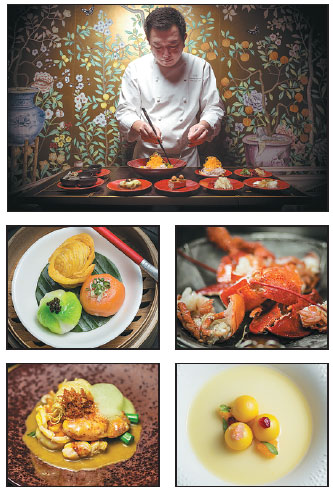HKK puts a London shine on Chinese New Year
"In some parts of China, it is tradition to eat and gift apples during Chinese New Year," says chef Tong Chee-hwee, "as the word apple in Chinese 'pinguo' sounds like the word 'peace'."
My friend and I are in London for Spring Festival, celebrating the holiday at the celebrated Chinese restaurant, HKK. That's the uber-upscale sibling of Hakkasan, the popular eatery that opened in London with the award-winning Tong as head chef in 2001. It won a Michelin star within a year that it retains today, and Hakkasan has since opened branches in Shanghai, San Francisco and elsewhere.
My excitement about apples betrays an embarrassing habit - I have skipped down through the special eight-course New Year menu to see what's for dessert. Happy day! There are two, including the green apple cardamom crisp noodle that has captured my fancy.
But all in good time.
Our Year of the Monkey starts with the Prosperity Platter, starring a fresh salad mix of crisp noodles, spicy greens, sprouts and jewel-toned pomegranate seeds, all lightly dressed with plum sauce and olive oil. It's served with a sparkling Japanese sake that's only 5 percent alcohol and very refreshing. Side plates offer nibbles of fatty pork with a crispy top, and a smoked Japanese oyster wrapped in Chinese cabbage.
Chef Tong, who now spends most of his time at HKK, says a traditional platter like this is the sort of dish that Chinese guests are looking for in London, though in China each city has its own food heritage.
Then comes Tai Ji Supreme Seafood Soup, actually a pair of soups in the same bowl: A brilliant yolk-yellow crab-roe soup and a rich white broth of flaky fresh crab are presented in a yin-yang design. Yin and yang play a significant part in Chinese cuisine as well as philosophy, reflecting the importance of balance and harmony in ingredients as well as in textures and flavors.
"The two soups represent the sky and the Earth," the meal's accompanying tasting notes say, "and these complementary forces are prayed to during celebratory festivities to bring brighter weather and improved crops."
Next on the table is another tradition that goes back thousands of years: dumplings for Spring Festival. What emerges from this kitchen's artful hands, though, is an exalted version of what you'd find at a traditional family gathering. The dumpling trio starts with a delicate gem of Dover sole wrapped in Chinese cabbage and sprinkled with black caviar, followed by a foie gras-filled morsel with Chinese chives, and finally a bite of puff pastry filled with slow-cooked chicken. Beside the plate is an artist's paintbrush, which we dip into a porcelain bowl of soy sauce to apply a final savory touch to our dumplings.
"We designed some special dumplings in our Dim Sum Trilogy on the HKK Chinese New Year menu," says Tong, "so we have used traditional dishes from all over China rather than one specific area".
Our next course is cherry wood-roasted Peking duck, stuffed with lemongrass, rock sugar and Chinese five-spice seasoning. The fruitiness of the cherry smoke is softly underscored by a wine pairing of sparkling rose.
Originally associated with royalty, the duck with its crispy skin and rich meat represents luxury and symbolizes fidelity.
Lobster noodle with XO sauce is also replete with meaning: The lobster, as the dragon of the sea, was long embraced by emperors as an imperial symbol that would bring good fortune to their lands.
"The symbolism of noodles extends far beyond the New Year - they represent the eater's life," Tong says.
Mala lamb, the final course before dessert, is prepared in Sichuan style, served with salsify and sticky-rice noodle. The wine pairing this time is our first red of the night, an earthy 2011 Ribera from Spain.
Dessert came as another trio: Vanilla dumpling with an infusion of osmanthus and mandarin, and then came that apple treat I mentioned earlier, a molecular green-apple parfait with cardamom cake and crispy apple noodle.
Then there is the Tray of Togetherness, a candy selection that's a perfect finale in a week that started with Chinese New Year and ended on Valentine's Day.
|
Chef Tong Cheehwee prepares Spring Festival treats at his Chinese restaurant, HKK, in London. Photos Provided To China Daily |



















